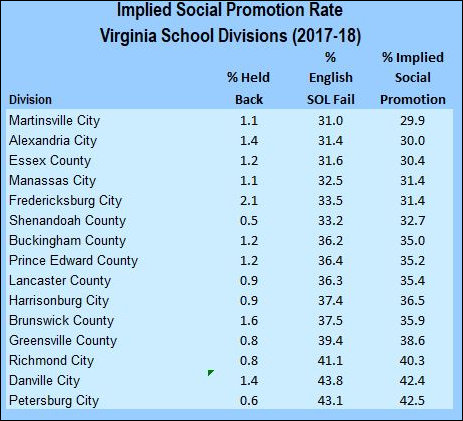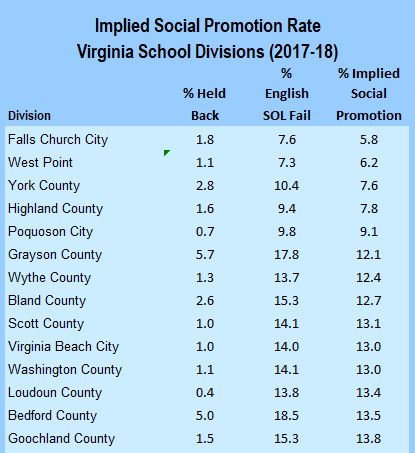Virginia school systems keep track of many numbers: enrollment, demographics, graduation rates, student-to-teacher ratios, SOL scores, all manner of fiscal expenditures… The list is endless. Just check out the Virginia Department of Education website’s “Statistics and Reports” page. But you can’t find any numbers on the rate of social promotions. Needless to say, the practice of promoting children from one grade to the next even when they have failed to master the subject matter is not one that educators want to highlight.
But John Butcher, the devious mastermind of Cranky’s Blog, has devised a way to guesstimate the prevalence of social promotions in Virginia schools. VDOE reports the percentage of students who do not repeat a school year, from which it is possible calculate, by means of simple arithmetic, the percentage of students who were held back. The hold-back ranges from 0.2% of the student body in Clarke County to 5.9% in Norfolk.
How do we know that more students shouldn’t be held back? Well, John compares the hold-back rate to the failure rate in Standards of Learning tests. John’s logic seems impeccable: If a student fails to demonstrate basic proficiency in English or math subject matter in, say, 5th grade, he or she has little business moving up to 6th grade. Schools do hold back some failing students, but only a small fraction. The rest continue on their merry way.
“Overall,” John writes, “22.6% of Virginia students did not pass the 2017 reading SOL tests while a mere 1.7% of the 2018 fall enrollment were students who had not been promoted.” (A similar discrepancy applies to math scores.)
 I carried John’s logic one step further. I took the percentage of students at each school division that failed their English SOL tests. From that, I deducted the percentage of students that the school division held back. The result was the implied social-promotion rate.
I carried John’s logic one step further. I took the percentage of students at each school division that failed their English SOL tests. From that, I deducted the percentage of students that the school division held back. The result was the implied social-promotion rate.
I say “implied” because I suppose one could argue that not every child who fails his or her English SOL should be held back a grade. Perhaps some students miss passing by a narrow margin. Perhaps they score really well in math, writing, and history. Perhaps they get good grades. The figure should be seen as an upper bound, not a precise number.
But even with that very important caveat, there is enormous variability between the school systems. Richmond, Danville and Petersburg all have an implied social-promotion rate of 40%. Say we cut that in half. That still suggests those three cities are probably moving a lot of kids through school who aren’t mastering their grade-level material. Conversely, Falls Church, West Point and York County have extremely low implied social promotion rates — 7.6% or less. If we cut those numbers in half, it’s clear that social promotion is not a significant practice in those school systems.
I am the first to concede that this is a back-of-the-envelope metric. I’m sure VDOE could devise a more authoritative measure. But VDOE is unlikely to do so on its own: Social promotion is a problem that many would like to sweep under the rug. If citizens want useful measures of how their schools are performing, they need to speak up!


Leave a Reply
You must be logged in to post a comment.